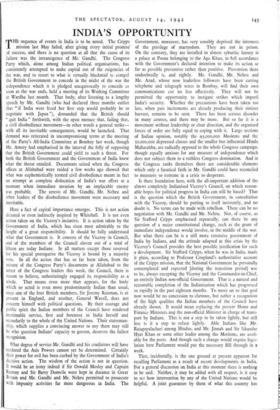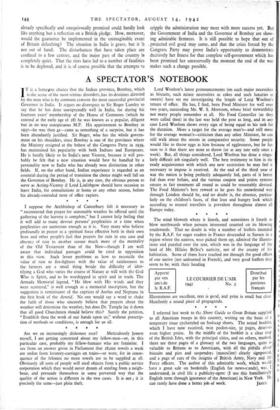INDIA'S OPPORTUNITY
THE sequence of events in India is to be noted. The Cripps mission last May failed, after giving every initial promise of success, and there is no question at all that the cause of its failure was the intransigence of Mr. Gandhi. The Congress Party which, alone among Indian political organisations, has consistently attempted to make capital out of the exigencies of the war, and to resort to what is virtually blackmail to compel the British Government to concede in the midst of the war the independence which it is pledged unequivocally to concede as soon as the war ends, held a meeting of its Working Committee at Wardha last month. That body, after listening to a lengthy speech by Mr. Gandhi (who had declared three months earlier that " if India were freed her first step would probably be to negotiate with Japan "), demanded that the British should " quit India " forthwith,' with the open menace that, failing that, a civil disobedience movement—in other words a general strike— with all its inevitable consequences, would be launched. That demand was reiterated in uncompromising terms at the meeting of the Party's All-India Committee at Bombay last week, though Mr. Amery had emphasised in the interval the folly of supposing that the British Government could yield to such a threat. For both the British Government and the Government of India knew what the threat entailed. Documents seized when the Congress offices at Allahabad were raided a few weeks ago showed that what was euphemistically termed civil disobedience meant in fact an attempt at complete dislocation of India's war effort at a moment when immediate invasion by an implacable enemy was probable. The arrests of Mr. Gandhi, Mr. Nehru and other leaders of the disobedience movement were necessary and inevitable.
Here a fact of capital importance emerges. This is not action dictated or even indirectly inspired by Whitehall. It is not even action taken on the Viceroy's initiative. It is action taken by the Government of India, which has risen most admirably to the height of a great responsibility. It should be fully understood what that Government is. It consists of the Viceroy in Council, and of the members of the Council eleven out of a total of fifteen are today Indians. In all matters except those reserved for his special prerogative the Viceroy is bound by a majority vote. In all the action that has so far been taken, from the seizure of the Congress Party's documents at Allahabad to the arrest of the Congress leaders this week, the Council, there is reason to believe, unhesitatingly engaged its responsibility as a whole. That means even more than appears, for the body. which so acted is even more predominantly Indian than usual, since one of the four British members, Sir Jeremy Raisman, is at present in England, and another, General Wavell, does not concern himself with political questions. By their courage and public spirit the Indian members of the Council have rendered inestimable service, first and foremost to India herself and secondarily to the whole of the United Nations. Their statesman- ship, which supplies a convincing answer to any there may still be who question Indians' capacity to govern, deserves the fullest recognition.
What degree of service Mr. Gandhi and his coadjutors will have rendered the Axis Powers cannot yet be determined. Certainly their power for evil has been curbed by the Government of India's decisive action. The wisdom of the action is not in question. It would be an irony indeed if Sir Oswald Mosley and Captain Ramsay and Sir Barry Domvile were kept in durance in Great Britain and Mr. Gandhi and Mr. Nehru permitted to prosecute with impunity activities far more dangerous in India. The Government, moreover, has very sensibly deprived the internees of the privilege of martyrdom. They are not in prison. On the contrary, they are installed in almost sybaritic luxury in a palace at Poona belonging to the Aga Khan, in full accordance with the Government's declared intention to make its action so far as possible preventive rather titan punitive. Prevention there undoubtedly is, and rightly. Mr. Gandhi, Mr. Nehru and Mr. Azad, whose now leaderless followers have been cutting telephone and telegraph wires in Bombay, will find their own communications cut no less effectively. They will not be permitted the opportunity to instigate strikes which imperil India's security. Whether the precautions have been taken too late, when past incitements are already producing their sinister harvest, remains to be seen. There has been serious disorder in many centres, and there may be more. But so far it is a movement without leadership or clear direction, and the organised forces of order are fully equal to coping with it. Large sections of Indian opinion, notably the 95,000,000 Moslems and the so,000,000 depressed classes and the smaller but influential Hindu Mahasahba, are radically opposed to the whole Congress campaign, though equally anxious for any measure of independence which does not subject them to a ruthless Congress domination. And in the Congress ranks themelves there are considerable elements which only a fanatical faith in Mr. Gandhi could have reconciled to measures so extreme in a crisis so desperate.
Is there foundation here, with the all-important addition of the almost completely Indianised Viceroy's Council, on which reason- able hopes for political progress in India can still be based? That is the question which the British Government, in consultation with the Viceroy, should be putting to itself insistently, and no doubt is. No terms can be made with rebellion. There can be no negotiation with Mr. Gandhi and Mr. Nehru. Nor, of course, as Sir Stafford Cripps emphasised repeatedly, can there be any question of a major constitutional change, such as the grant of immediate independence would involve, in the middle of the war. But what there can be is a still more extensive government of India by Indians, and the attitude adopted at this crisis by the Viceroy's Council provides the best possible justification for such a development. Sir Stafford Cripps, when he was in India, made it plain, according to Professor Coupland's authoritative account of the Cripps mission, that the National Government he personally contemplated and expected [during the transition period] was to be, always excepting the Viceroy and the Commander-in-Chief, an entirely Indian non-official Government. That is a natural and reasonable completion of the Indianisation which has progressed so rapidly in the past eighteen months. To move on to that goal now would be no concession to clamour, but rather a recognition of the high qualities the Indian members of the Council have already shown. It would mean replacing the present Home and Finance Ministers and the non-official Minister in charge of trans- port by Indians. This is not a step to be taken lightly, but still less is it a step to refuse lightly. Able Indians like Mr. Rajagopalachari among Hindus, and Mr. Jinnah and Sir Sikandar Hyat Khan or some other leader among the Moslems, are avail- able for the posts. And though such a change would require legis- lation here Parliament would put the necessary Bill through in a week.
That, incidentally, is the one ground at present apparent for recalling Parliament as a result of recent developments in India. For a general discussion on India at this moment there is nothing to be said. Neither, it may be added with all respect, is it easy to set how intervention by any of the United Nations would be helpful. A joint guarantee by them of what this country has already specifically and unequivocally promised could hardly look like anything but a reflection on a British pledge. How, moreover, would the guarantee be implemented in the unimaginable event of Britain defaulting? The situation in India is grave, but it is not out of hand. The disturbances that have taken place are confined to a few centres, and the major part of the country is completely quiet. That the riots have led to a number of -fatalities is to be deplored, and it is of course possible that the attempts to cripple the administration may meet with more success yet. But the Government of India and the Governor of Bombay are show- ing admirable firmness. It is still possible to hope that out of . projected evil good may come, and that the crisis forced by the Congress Party may prove India's opportunity to demonstrate decisively her fitness for that complete self-government which has been promised her unreservedly the moment the end of the war makes such a change possible.























 Previous page
Previous page